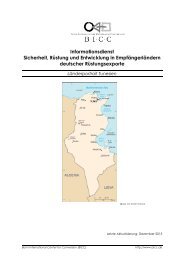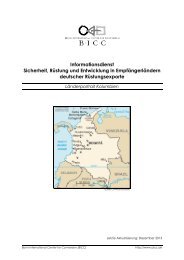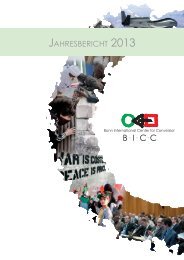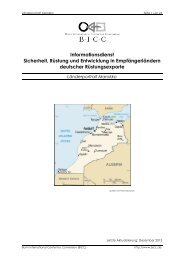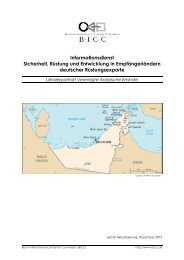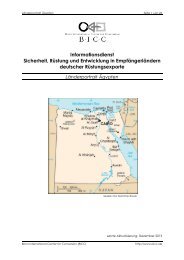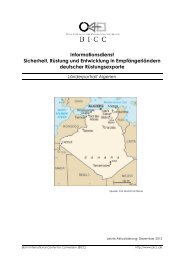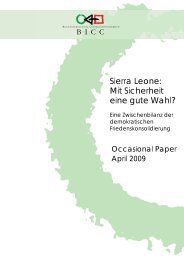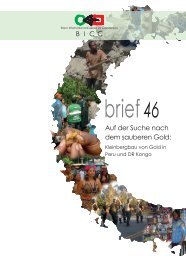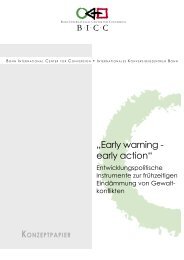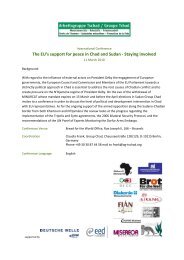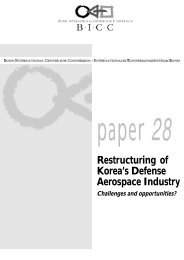English - BICC
English - BICC
English - BICC
Create successful ePaper yourself
Turn your PDF publications into a flip-book with our unique Google optimized e-Paper software.
were allowed into the talks process,<br />
without the obligation of<br />
decommissioning of any sort, Unionist<br />
rage was palpable. Vociferous attacks<br />
were made upon both the British<br />
government and Sinn Fein. Ken<br />
Maginnis, the UUP’s security<br />
spokesman, lamented the fact that,<br />
after the UUP had “most reluctantly<br />
accepted” the Mitchell compromise,<br />
the government felt secure enough to<br />
elevate “an evil Mafia” to the<br />
conference table by “sleight of hand”<br />
(Irish Times, 24 September 1997).<br />
Trimble called for the expulsion of<br />
Sinn Fein from the talks after the IRA<br />
announced that it had difficulties with<br />
the Mitchell Principles, a move which<br />
he described as a “contemptible little<br />
trick” (Irish Times, 12 September 1997).<br />
Similarly, the Unionist leader took<br />
delight at the SDLP’s support for the<br />
principle of consent in the talks and<br />
Sinn Fein’s objection. This marked “the<br />
start of the process of the<br />
marginalisation of Sinn Fein and the<br />
break up of the pan-nationalist front”<br />
(Irish Times, 25 September 1997). This<br />
rhetoric reflected more bark than bite.<br />
Sinn Fein had gained entry into the<br />
talks despite Unionism’s insistence on<br />
decommissioning; yet Ulster Unionists<br />
could not bring themselves to walk out<br />
of the process, a move which would<br />
brand them as spoilers and cost them<br />
influence with the two governments.<br />
Consequently, there was a need to<br />
insulate themselves from the criticism<br />
of Unionists fervently opposed to the<br />
process. Engaging Sinn Fein only<br />
through proximity talks was one<br />
means, another was to adopt the most<br />
vocally confrontational stance against<br />
Republicans. Such criticism could only<br />
intensify following the signing of the<br />
Agreement, especially since<br />
Republicans did not hand in weaponry<br />
even after the negotiations and<br />
endorsement of the Agreement in<br />
referenda north and south of the<br />
border.<br />
The UUP took a firm line on the<br />
question of forming an executive with<br />
Sinn Fein in their manifesto released<br />
shortly before the elections to the new<br />
Assembly. For Sinn Fein to take up<br />
their ministerial posts, there would<br />
have to be a statement that the war was<br />
over, an end to punishment beatings,<br />
the progressive dismantling of<br />
paramilitary structures, and complete<br />
disarmament within two years (Belfast<br />
Telegraph, 9 June 1998). The Unionists<br />
were compromising in the short term,<br />
but issuing a costly post-dated cheque<br />
that would have to be cashed in the<br />
near future. By projecting strict terms<br />
into the future, pro-Agreement<br />
Unionists were playing for time against<br />
those who opposed the deal in the here<br />
and now. It was a tactic which would<br />
be resurrected through the next phase<br />
of the process.<br />
Loyalist dealings with<br />
the IICD<br />
Whilst both the PUP (Progressive<br />
Unionist Party) and UDP (Ulster<br />
Democratic Party) had signed up to the<br />
Mitchell principles, developments<br />
within Loyalism pointed to a mixed<br />
attitude to decommissioning. On the<br />
one hand, the Ulster Volunteer Force<br />
(UVF) were quick to appoint the PUP’s<br />
Billy Hutchinson as their direct liaison<br />
with the IICD (Belfast Telegraph, 25 May<br />
1998). Both the Ulster Defence<br />
Association (UDA) and UVF fully<br />
supported the Belfast Agreement<br />
whilst even the extremist splinter<br />
group, the Loyalist Volunteer Force<br />
(LVF), declared a ceasefire. In<br />
December 1998, this latter group<br />
actually handed in a small number of<br />
munitions to the IICD; the first and so<br />
far only act of voluntary<br />
decommissioning (Belfast Telegraph, 18<br />
December 1998). This move was<br />
prompted more by short term<br />
considerations than any commitment<br />
to a process of disarmament; in<br />
particular the need to secure the early<br />
release of their prisoners.<br />
UDA/UDP electorally<br />
unrepresented<br />
Movement sometimes appeared likely<br />
from the largest Loyalist group. John<br />
White of the Ulster Democratic Party<br />
B·I·C·C<br />
run-up to the agreement<br />
(UDP) stated that he would<br />
recommend that the UDA should<br />
make the first move on disarmament<br />
and so pressurise Republicans to follow<br />
suit (Belfast Telegraph, 21 June 1998). But<br />
there were certain indications of a<br />
more complex picture. Firstly, the<br />
UDA did not appoint a liaison to the<br />
IICD and it seemed unlikely that they<br />
would begin the process of<br />
disarmament. In fact, several months<br />
before the Agreement, the UDA had<br />
broken its ceasefire in retaliation for<br />
the assassination of the Loyalist<br />
Volunteer Force leader Billy Wright.<br />
They had a reputation as the most<br />
volatile of the two main Loyalist<br />
paramilitary groups, a volatility that<br />
proved difficult to assuage given that<br />
the UDP failed to gain a single seat at<br />
the Assembly elections. Even those<br />
linked to the UVF ultimately felt that<br />
decommissioning was unlikely to<br />
happen even in a benign scenario. As<br />
Billy Hutchinson said, “if the IRA<br />
decommission that doesn’t mean the<br />
UVF will. It’s not in the UVF’s<br />
interests to decommission. It’s in the<br />
UVF’s interests to ensure that Loyalist<br />
areas remain protected” (Belfast<br />
Telegraph, 10 October 1998).<br />
Loyalist decommissioning seemed a<br />
long way off, set somewhere in the<br />
hazy distance. A message from the<br />
UVF Command Staff stated that “the<br />
Ulster Volunteer Force will retain their<br />
weaponry, regardless of political<br />
expediency, until such times as the<br />
people of Ulster are guaranteed a<br />
future safe from the despotism of<br />
armed Irish Republicans” (Combat,<br />
December 1998). There were to be no<br />
olive branches. As Gerry Kelly, a<br />
leading Sinn Fein negotiator and longtime<br />
adversary of Loyalism would say,<br />
the Belfast Agreement was a “contract<br />
between opponents” (An Phoblacht, 15<br />
April 1998); behind its words lay<br />
mistrust, not a sense of partnership or<br />
reconciliation. How would<br />
decommissioning be resolved against<br />
this backdrop?<br />
33



